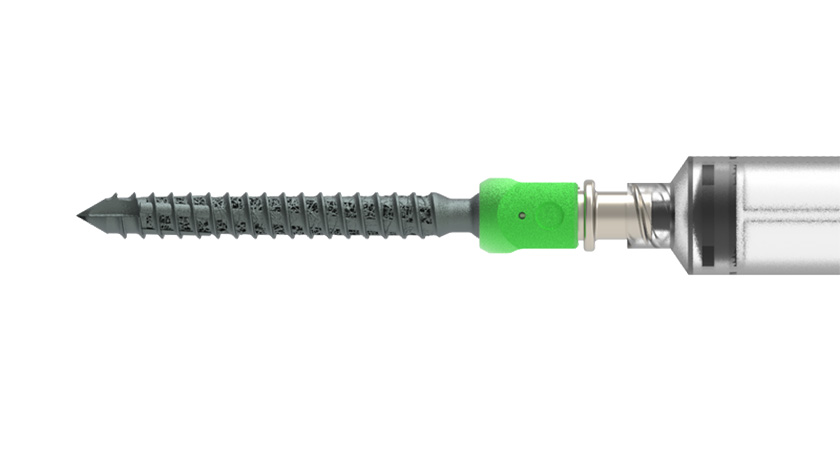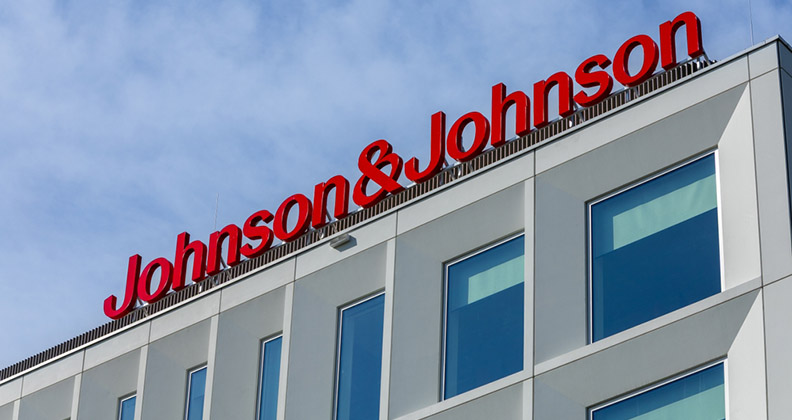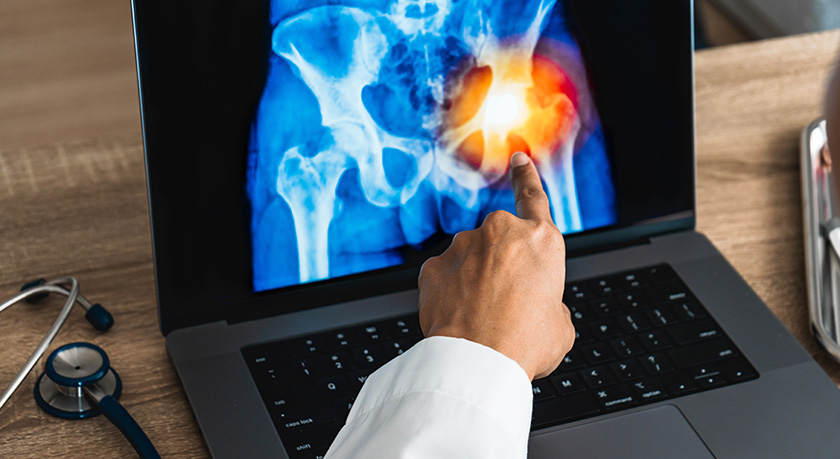
By ORTHOWORLD’s estimates, sports medicine accounts for 11% of the overall orthopedic market by revenue. Arthrex and Smith+Nephew dominate the segment in sales, leading the over 200 companies that also play in the space.
Here are highlights from entities that comprise that group—strategic announcements from the past year. All are within various stages of commercialization.
Active Implants announced two-year results of the MERCURY study, showing that the company’s NUsurface Meniscus Implant provides statistically superior pain relief beginning at six months compared to non-surgical therapy.
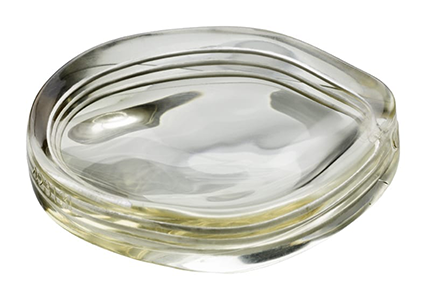
Active Implants NUsurface Implant
The NUsurface Implant is the first “artificial meniscus” to be marketed in Europe and is currently under review by FDA. The medial meniscus replacement mimics the function of the natural meniscus and treats pain by redistributing loads transmitted across the knee joint. It was granted a Breakthrough Device Designation from the FDA in 2019.
The MERCURY Study is the longest and most extensive study of a meniscus implant in the world, enrolling 242 patients experiencing persistent knee pain after a previous meniscectomy: 176 were treated with the NUsurface Implant and 66 with non-surgical therapy. Results of the study include:
- 84% of patients treated with the NUsurface Implant experienced a 10-point improvement from baseline in Knee Injury and Osteoarthritis Outcome Score (KOOS) Pain, which is considered the minimum clinically relevant improvement in pain and function.
- 89% of patients who received the NUsurface Implant completed 24 months of follow-up.
- Patients with replacement implants achieved superior results the second time; 70% of patients used one implant and 20% received a replacement implant.
- Obese and older patients had the highest response rates.
- MRI evidence showed the NUsurface Implant may preserve femoral cartilage, while the control patients showed evidence of significant cartilage deterioration.
NUsurface is currently marketed in Belgium, Germany, Italy, Switzerland, the UK and Israel.
Biorez received FDA 510(k) clearance to market two sizes of the BioBrace Implant. This new biocomposite soft tissue scaffold is intended to be used in a range of surgical procedures to reinforce soft tissue where weakness exists, and can be used with existing surgical techniques and instrumentation.
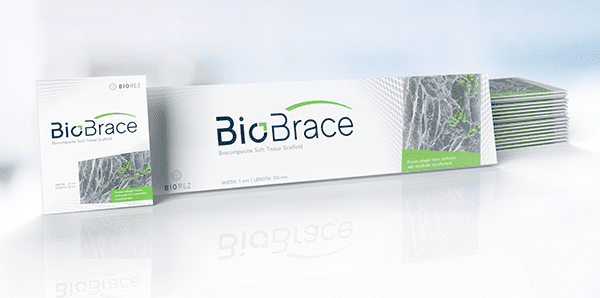
Biorez BioBrace
The novel biocomposite design of BioBrace features a highly porous collagen matrix and resorbable PLLA microfilaments. This yields a bio-inductive scaffold with strength, which is designed to both reinforce tendon and ligament repairs and promote healing. The implant is fully resorbable, and is naturally broken down by the body.
BioBrace offers an alternative to implant materials that are either synthetic or biologic, which limits their use and effectiveness as augmentation materials in tendon and ligament repair.
CartiHeal announced two-year results of a pivotal Investigational Device Exemption study (IDE). The study was conducted to test the potential superiority of the Agili-C implant vs. microfracture and debridement for the treatment of joint surface lesions, chondral and osteochondral defects, in the knee joint. The IDE study is a multicenter, 2:1 randomized, open-labeled and controlled trial. 251 Subjects, 167 in the Agili-C™ arm and 84 in the SSOC arm, were enrolled in 26 sites in the U.S. and outside the U.S.

CartiHeal Agili-C Implant
The primary endpoint for this study was the change from baseline to 24 months in average of the 5 subscales of the Knee injury and Osteoarthritis Outcome Score (KOOS Overall): Pain, Other Symptoms, Quality of Life – QOL, Activities of Daily Living – ADL and Sports. The KOOS Overall Score ranges from 0 to 100, where higher values represent better outcomes.
The data generated from this trial demonstrated superiority of Agili-C to the current surgical standard of care (debridement or microfracture). The Bayesian posterior probability of superiority at Month 24 was determined to be 1.000, exceeding the prespecified threshold of 0.98 required to demonstrate superiority.
Embody announced the expansion and clinical use cases of TAPESTRY Biointegrative Implant in the U.S. TAPESTRY is reportedly the first collagen-based implant with a bioengineered micro-architecture and biostimulative type I collagen chemistry, specifically designed for the management and protection of tendon injuries.
The combination of collagen chemistry and structural integrity provides clinical utility and sizing across a broad range of tendon applications including, but not limited to, foot/ankle, knee and shoulder procedures.
The device received FDA 510(k) clearance in 4Q20 for tendon and ligament repair.
Hyalex Orthopaedics’ HYALEX Cartilage System was granted Breakthrough Device Designation from FDA. The system is intended to repair cartilage defects and restore function for patients with loss of knee articular cartilage and bone requiring surgery.
Unlike other cartilage solutions requiring multiple surgeries and regeneration, HYALEX Cartilage is a biomimetic materials platform designed to provide a single-step, off-the-shelf, high strength, low friction, low wear solution. Hyalex Orthopaedics has published evidence of preservation of the cartilage counter-face with its HYALEX Cartilage and is protected by more than 17 patents and trademarks worldwide.
Miach Orthopaedics commenced limited U.S. launch of the BEAR Implant in select cities for the treatment of anterior cruciate ligament (ACL) tears. The BEAR Implant was also awarded a Popular Science Best of What’s New Award for representing a significant step forward in health.
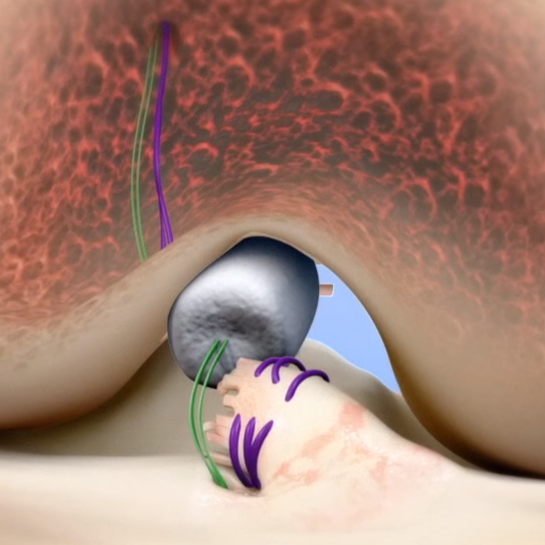
Miach BEAR ACL Repair
The BEAR Implant is the first medical technology to clinically demonstrate that it enables healing of a patient’s torn ACL. It offers an alternative to the current standard of care – reconstruction that replaces the ACL with a graft.
The proprietary, bio-engineered BEAR Implant restores ACL quality and size similar to the non-injured ACL, results in faster recovery of muscle strength and has better patient satisfaction with being ready to return to sports. The BEAR Implant also does not require a graft, eliminating the need for a second wound site to heal and worries about donor graft quality or risk of disease.
Nanova Biomaterials introduced FiberFIX suture anchors and interference screws, developed using patented nanocomposite technology. FiberFIX suture anchors and interference screws have demonstrated enhanced resistance to breakage/stripping during insertion and increased pull-out strength after-insertion, which reduces the failure rates during orthopedic operations. Real-time degradation tests on FiberFIX devices have also indicated adequate mechanical stability for 3 months and no sign of self-catalytic degradation over 2 years of observation, which brings significant benefits in soft tissue fixation in sports medicine.
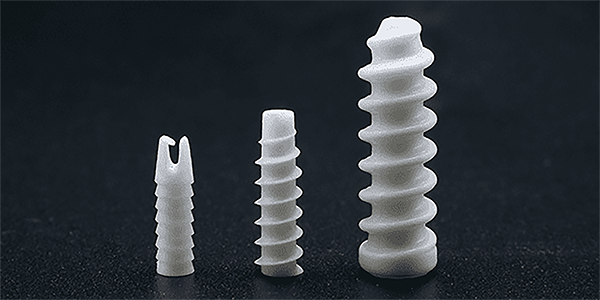
Nanova Biomaterials FiberFIX Implant
FiberFIX represents a new generation of bioresorbable materials developed using breakthrough nanotechnology: biocomposites enhanced by specially modified single crystalline hydroxyapatite (HA) nanofibers. Nanofibers are about 100 nanometers in diameter and tens of micrometers in length with a strength close to its theoretical strength, several times stronger than stainless steel. Just like re-bar in concrete, our specially modified nanofiber can effectively strengthen the mechanical properties of the composites. Furthermore, with over-100 times greater surface area than traditional calcium phosphate particles, our modified nanofibers im-prove the acid buffering ability of FiberFIX devices, reduce acidic degradation of the composites, and minimize the body’s inflammatory response.
Smith+Nephew launched its FAST-FIX FLEX Meniscal Repair System, reportedly the only device to offer a surgeon-guided, bendable needle and shaft providing access to all zones of the meniscus. Improving access leads to a greater opportunity to repair the meniscus rather than remove it, resulting in long-term benefits to the patient.
Building on the 15-year clinical legacy of its FAST-FIX platform, Smith+Nephew’s new FAST-FIX FLEX system uses an all-inside approach which may eliminate the need for further incisions, reduce the risk of neurovascular injury, and provide procedural efficiency to support faster operating times. The added ability to bend both the needle and shaft enables surgeons access to the mid-body and anterior zones, inaccessible by previous FAST-FIX devices. These meniscal zones account for more than 40% of tears in stable adult knees or roughly 400,000 procedures, (meniscal repairs and meniscectomies) per year in the US alone.
FAST-FIX FLEX offers a 25% reduction in needle insertion area as well as a repair that is more than 20% stronger than the previous generation FAST-FIX 360 System.
Stryker announced FDA clearance of InSpace, the first balloon implant for arthroscopic treatment of massive irreparable rotator cuff tears (MIRCTs). The technology was acquired from OrthoSpace in 2019 and is the first of its kind in the U.S. market. The InSpace balloon implant has a long successful clinical history of over 10 years and 29,000 balloons implanted outside of the US, as well as the Level I study conducted across North America.
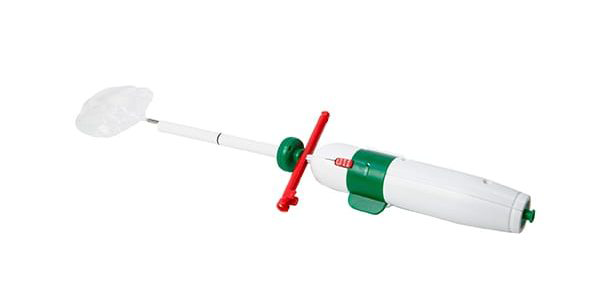
Stryker InSpace Balloon
The InSpace balloon implant is designed to restore the subacromial space without requiring sutures or fixation devices and has been demonstrated to improve shoulder motion and function.
JAV
Julie A. Vetalice is ORTHOWORLD's Editorial Assistant. She has covered the orthopedic industry for over 20 years, having joined the company in 1999.

